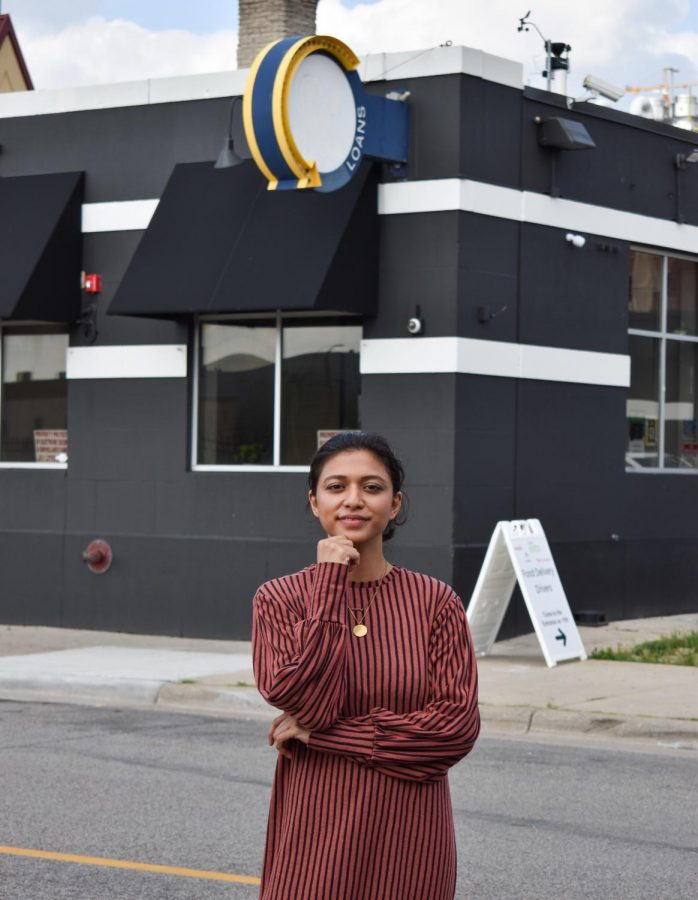From an early upbringing in Lahore, Pakistan, to a life in New York, New York, Sabahat (Saba) Imran has been immersed in a world of brightly colored, deeply flavored food culture for as long as she can remember.
Saba Dhaba Do, founded by Imran this year, is a ghost kitchen serving “street-food inspired Pakistani and South Asian cuisine.” Located in the Currie Food Hall in north Minneapolis, Imran and her family are currently running the business in the hopes of bringing authentic Pakistani cuisine to the Twin Cities.
Imran moved to the Twin Cities in 2008 for a job in pharmaceuticals. She ended up leaving that job when her kids were born, cementing her roots in Minnesota alongside her husband despite having no family here. As the years passed by and the desire to return to work grew, Imran quickly realized that she had no interest in reentering that industry.
“I thought to myself, ‘Minnesota does lack Pakistani food,’” Imran said. “I figured I might as well do something I’m really good at and passionate about. I love bringing people together, and I feel like one thing that is a constant about that is food. Food brings people together, sparks conversations, ideas. Food is always there. I want to bring that to everyone.”
And so, Saba Dhaba Do was born. Imran wanted the name to be something fun, hence the “Scooby Dooby Doo” rhyme. “Saba” incorporates her own name, while “Dhaba” — a roadside restaurant or street cart — serves as a reflection of the “street food inspired flavors” she’s cooking.
Saba Dhaba Do’s menu highlights include both a chicken and vegetable biryani, chicken samosas, creamy raita, “green with envy” chutney, and Imran’s personal favorite: a spicy chicken karahi.
Maintaining freshness and using quality ingredients is a priority for Imran. She visits local farmers markets and grocery stores throughout the week to purchase a variety of produce and spices used in her cooking, including the mangoes used in fresh salads on the menu. She spent countless hours in pursuit of the best solution to procure high quality halal meats. Additionally, she prioritizes using minimal oil in her cooking — which she says sets her food apart from traditional Pakistani food.
“I don’t even have a deep fryer in my kitchen,” Imran said. “I pan fry with olive oil. The traditional way of cooking this food is really heavy on the oil. I’ve been cooking like this since I was 18, and I’ve realized I don’t have to do it that way.”
Imran said that some of the feedback she’s received so far has been to make sure she keeps the spice levels of her dishes exactly where they’re at.
“One of the things that struck me was that it had heat to it,” said Kat Peterson, Twin Cities-based food and beverage photographer, regarding her first experience trying Saba Dhaba Do. “It had a really good flavor.”
While her cuisine is new to many Minnesotans, Imran has no desire to dampen the traditional Pakistani flavors that serve as the backbone of her dishes in order to market it as more palatable.
“Going into it, I figured that if I’m going to do authentic Pakistani food, then it’s going to have to be done the way we know it’s cooked,” Imran said. “I was really scared, especially with the Minnesota palette. But it’s been so surprising, because everyone loved it.”
Spices are a key aspect of Pakistani cuisine. The way that spices are used is the main difference between Pakistani and Indian cuisine, according to Imran. She says that the difference in quantity used is often the distinguishing factor among the two similar cuisines.
“I want people to know the difference, what Pakistan is and who Pakistani people are,” Imran said. “Even if I can bring a little bit of awareness, that would be excellent.”
“Saba is such a delightful person,” said Ross Sandell, co-owner of Ombibulous, a local marketplace that hosted Saba Dhaba Do at the store’s weekly market. Sandell spoke highly of the generous portions and fresh flavors. “I think they have it in them to do very well.”
Nearly one month into business, Imran is slowly getting the hang of things. Between marketing, scheduling and working to meet customer demand, the learning curve of getting things off the ground is keeping her occupied. However, she said that her dreams of future endeavors may include local pop-ups, a food truck or even a brick-and-mortar store one day.
“The goal is to shift the world into a better place,” Imran said. “My goal is not to make money — it’s to maybe spark conversations, maybe bring people together; all to make this positive shift happen.”








